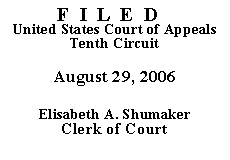

| UNITED STATES OF AMERICA,
Plaintiff-Appellee, |
|
| v. | |
| BOBBY FITZGERALD PRINCE, SR., |
I. Background
On June 3, 2005, Prince pleaded guilty to knowingly transporting two minors in interstate commerce with the intent they engage in prostitution in violation of 18 U.S.C. § 2423(a) and was sentenced to 150 months imprisonment. As part of his plea agreement, Prince agreed to waive his right to appeal or otherwise collaterally challenge his guilty plea or sentence.
Despite this agreement and knowing that his time to file a notice of appeal had lapsed, on September 19, Prince motioned the district court to grant him leave to file a notice of appeal. The district court denied the motion, finding that Prince did not meet his burden of showing excusable neglect. Additionally, the court noted that granting the motion would create a substantial danger of unfair prejudice to the government in light of Prince's waiver of his right to appeal. Prince timely appealed from the denial of this motion.
II. Analysis
We review a district court's order refusing to extend the time for filing a notice of appeal for abuse of discretion. Bishop v. Corsentino, 371 F.3d 1203, 1206 (10th Cir. 2004).
A criminal defendant has 10 days from entry of either the judgment or order being appealed to file a notice of appeal. See Fed. R. App. P. 4(b)(1)(A)(i). However, upon a showing of excusable neglect or good cause, the district court may extend the time to file a notice of appeal for 30 days from the original 10-day deadline. See id. 4(b)(4). Here, Prince did not file his notice of appeal until September 19, 2005--108 days after the original judgment, or stated differently, 68 days after the expiration of the 30-day extension. Clearly, then, Prince's motion was untimely.
There is some dispute whether the requirement for a timely notice of appeal amounts to a claim-processing rule or a jurisdictional rule. See Eberhart v. United States, 126 S. Ct. 403 (2006). However, we do not need to resolve that dispute here, because under either interpretation, Prince was required to timely file his notice of appeal: (1) if the requirement is jurisdictional, it is clear that we lack jurisdiction to hear Prince's original appeal; and (2) if the requirement is simply for purposes of claim-processing, we still cannot hear the appeal because the government raised this defense before the district court. See id. at 407. Therefore, under either interpretation, we find that the district court lacked authority to grant Prince's motion to extend his time to file a notice of appeal. Consequently, the court did not abuse its discretion in denying Prince's requested relief.
III. Conclusion
Accordingly, for the reasons stated above, we DISMISS this appeal.
Entered for the Court
Timothy M. Tymkovich
Circuit Judge
*. This order is not binding precedent, except under the doctrines of law of the case, res judicata, and collateral estoppel. The court generally disfavors the citation of orders; nevertheless, an order may be cited under the terms and conditions of 10th Cir. R. 36.3.
2. After examining the briefs and the appellate record, this three-judge panel has determined unanimously that oral argument would not be of material assistance in the determination of this appeal. See Fed. R. App. P. 34(a); 10th Cir. R. 34.1(G). The cause is therefore ordered submitted without oral argument.